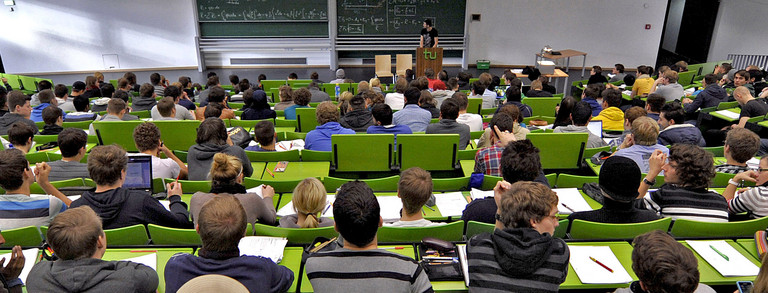Empirical Multilingualism Research
Summary
| Degree | Master of Arts (M.A.) |
|---|---|
| Subject group | Social Sciences and Cultural Studies |
| Standard program duration | 4 semesters |
| Admission requirements |
none
|
| Start of studies |
Winter semester
|
| Language | German |
| Enrollment requirements | |
| Further information | Website of the study program |
Overview
How can people acquire several languages at the same time or one after the other? What does multilingualism mean for an individual’s identity? And what is the impact of multilingualism on society and education policy? These are some of the questions tackled in the Master’s program in Empirical Multilingualism Research. It is run jointly by TU Dortmund University and Ruhr-Universität Bochum and deals with the various aspects of multilingualism – currently a hot topic in society. The program combines linguistics, language and philology and has a strong focus on empirical linguistics research.
From the start of the program onwards, students are introduced systematically to research methods and encouraged to develop and explore questions independently. Apart from the teaching of empirical and experimental methods, a further priority is the commensurate presentation of scientific results.
The program primarily targets graduates with a Bachelor’s degree in philology or a closely related discipline with a deeper interest in linguistic multilingualism research.
Skills and knowledge
The program prepares students for doctoral studies and an academic career in multilingualism research or philology. Graduates are also qualified in the best possible way for professional activities that require a high level of expertise in the theories and methods of linguistics and in multilingualism research, for example in test institutes, foundations, clinical or research institutions or in project management, but also outside academia. Employment possibilities are also found in integration agencies and organizations concerned with fostering language and multilingualism.
Field of activity
The program prepares students for doctoral studies and an academic career in multilingualism research or philology. Graduates are also qualified in the best possible way for professional activities that require a high level of expertise in the theories and methods of linguistics and in multilingualism research, for example in test institutes, foundations, clinical or research institutions or in project management, but also outside academia. Employment possibilities are also found in integration agencies and organizations concerned with fostering language and multilingualism.
Additional information
The Master’s degree program in „Empirical Multilingualism Research“ is based across universities at TU Dortmund University and Ruhr-Universität Bochum, thus combining the expertise of both universities. In addition to its strong focus on empirical linguistic research, the program is also characterized by being cross-linguistic and cross-philological.
In the 3rd semester, students complete a compulsory internship with research relevance. This internship offers the opportunity of a professional field orientation and can be completed at an institution of choice in Germany or abroad on a full-time or part-time basis.




![[Translate to English:] Partner Four hands are holding the green logo of TU Dortmund University](/storages/tu_website/_processed_/1/d/csm_Partner_Nicole_Rechmann_KW_40b35bb3fd.jpg)




![[Translate to English:] Forschung An apparatus with tubes in a laboratory](/storages/tu_website/_processed_/0/c/csm_Forschung_Juergen_Huhn_cbd34afd6d.jpg)
![[Translate to English:] Studium Five students are sitting in a lecture hall. They are talking to each other.](/storages/tu_website/_processed_/c/9/csm_Studium_FelixSchmale_81d94adc86.jpg)





